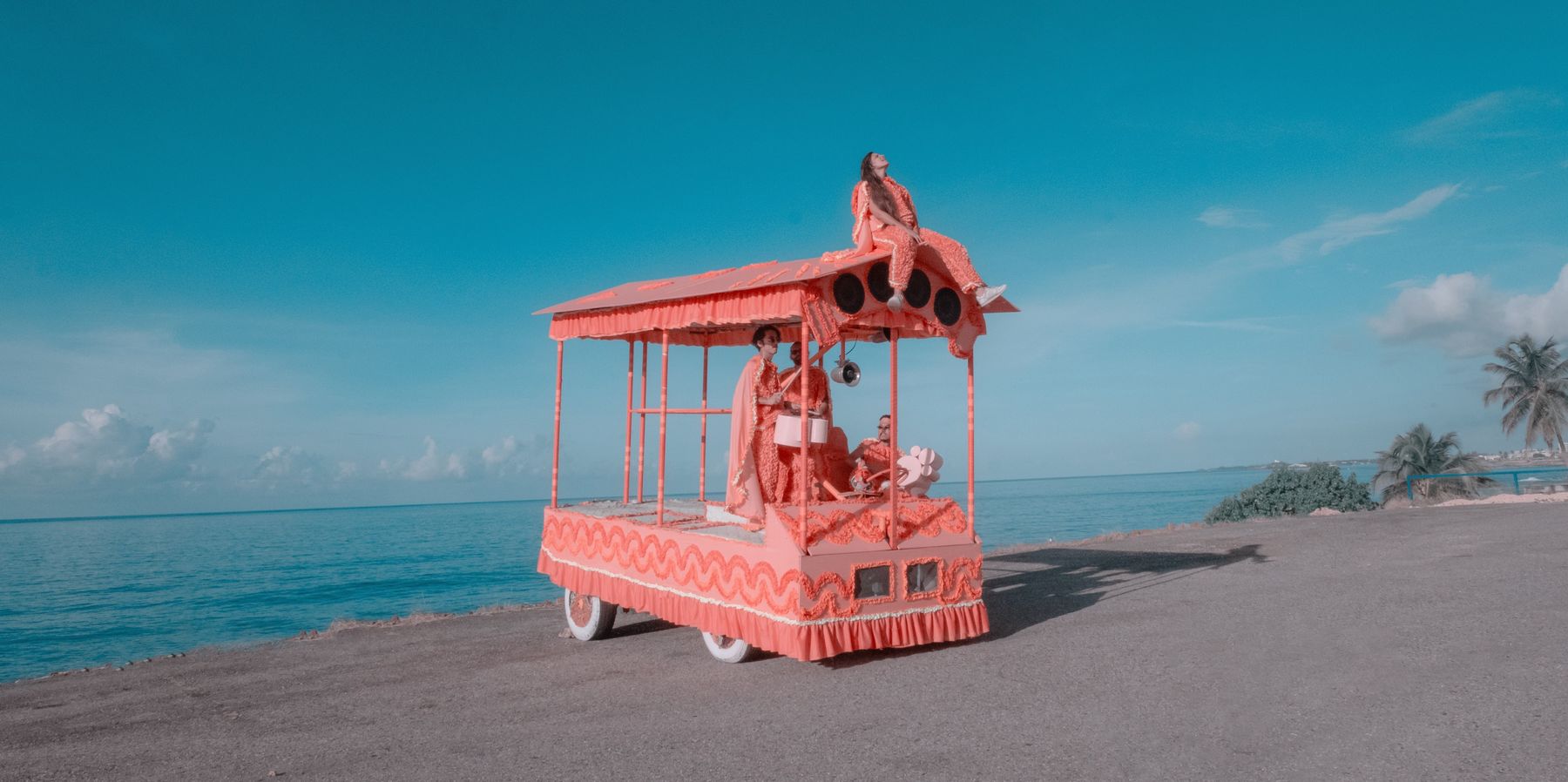
Entertainment
Buscabulla Debuts 'Vámono,' a Colorful Call to Action for Puerto Rico
Story by Jhoni Jackson / Photography by Supakid
25 September 2019

Around six months after Hurricane Maria devastated Puerto Rico in September of 2017, Raquel Berrios and Luis Alfredo Del Valle, founders of synth-pop outfit Buscabulla, finally answered the perpetual call to return home to their native island.
"Vámono" was the first song they wrote since moving back. Today, they've premiered its video, directed by Claudia Calderón and inspired by long-standing Puerto Rican traditions: the folkloric vejigante masks centric to the Carnaval de Ponce, where Del Valle is from, and the Festival de Las Mascaras in northern Hatillo where, along with nearby Arecibo, Berrios' ancestors lived and died.
Over time, these festivals have adapted to modern culture: The Dec. 28 Masks of Hatillo Festival, dating back to 1823, is no longer a parade on horseback. Now, it's all about wildly decorated, wheelie-popping floats soundtracked by reggaeton blasting through crowded, chaotic streets. And while many of the "gangs" showcased have updated to modern themes (e.g. SpongeBob, Smurfs), they're still acting out the biblical tale on which the festival was founded — Innocents' Day — by portraying the soldiers deployed by King Herod to slaughter Bethlehem's children.

For Del Valle, part of the appeal of these hyper-local festivals is in their commitment to community: "It's a cultural thing that goes even beyond the sponsorship of the state or the country. It's an organic, community thing," he says.
Berrios agrees, and was especially fascinated by a story about a gang that dedicated its float to the late mother of one of its members. "They went to the cemetery and performed the wheelie, and under the float, they had made in beautiful letters, 'Para ti, Madre,'" she says.
Rediscovering their own culture — and new, evolving expressions of it — has been a recurring theme since the pair returned home. In "Vámono," Buscabulla's own float represents, in part, hope for Puerto Rico's future, decorated with the word "regresa," meaning "come back."
Politicizing their music is somewhat new for Del Valle and Berrios — in terms of speaking directly to Puerto Rico's issues through song, at least. Their previous EPs, while fan-beloved, beautiful collections of feather-like, slow-danceable synth-pop, offer few, if any, pointed statements of activism.
But in relocating to the island's west coast, they're seeing firsthand how the island has changed: "A lot of people are leaving, a lot of Americans are coming in and buying land," Berrios says. "Especially for our generation, it's a really hard place for people to stick around in."

During all their years living in New York, like so many Puerto Ricans of the diaspora, they were never mentally far from home. After Maria, for example, the couple was vigilant in speaking out about the failing emergency response, and helped raise funds for survivors. Along with fellow Puerto Rican musician Ani Cordero, they created PRIMA, an organization which post-storm awarded grants to local creatives in need. It continues to advocate for and deliver opportunities to independent Puerto Rican artists still.
Berrios and Del Valle, however, have a 5-year-old daughter, and they wanted her to grow up in Puerto Rico, immersed in their culture and away from the "messed-up shit," like the uptick in school shootings, that riddles the U.S. Del Valle describes their return as bittersweet; Berrios adds that, because of the continued decline in quality of life of Puerto Ricans — more than 40% live in poverty — "there's a melancholy."
"The U.S. is the land of opportunity, and Puerto Rico is kind of messed up. But I choose home," she says. "I'm going to have to probably hustle both places anyway. Why not be home and just try and make it a better place? There's no really other better option."
Last night, PAPER spoke with the Buscabulla founders about all that went into "Vámono," and in the process, they shed some light on what to expect from their debut LP, out early next year.
It looks like a lot went into the creation of this video; the intricacy of design in the outfits, the float.
Raquel: When we were trying to develop the Hatillo masks, we kept on [finding] that either seamstresses had died, and a lot of people had left the island. The resources to make these celebrations happen... you can kind of see how they're slowly [disappearing]. Seamstresses, in particular — you don't really see a lot of younger people taking on the kind of confection of these sort of dresses.
Luis: We worked with two local seamstresses and production-world seamstress. The two local seamstresses are the ones that actually make the dresses for the carnivals, and one of them is 76.
Raquel: And she's started to get arthritis. You can kind of see how she's losing steam — but she was excited to do it.
Luis: And neither [seamstress] has an apprentice or anybody who's under them; it's just them. [The craft] might leave with them. It's one of those things where, little by little, those things, they disappear along with the people who are here.
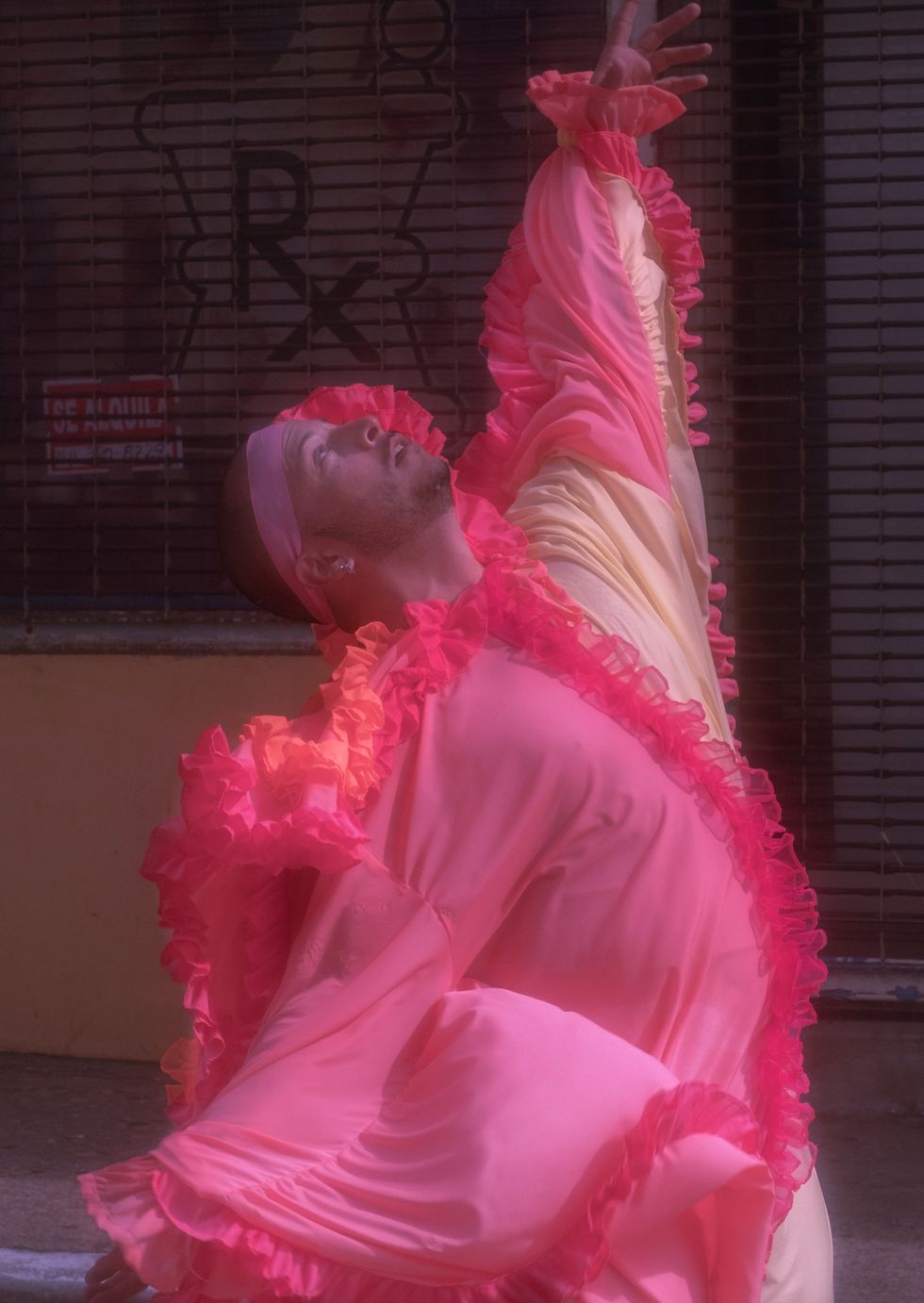
How did you find a float?
Luis: When we were looking around for seamstresses, we found Ana in Manatí, who does the dresses for the Hatillo gangs. We told her about this idea that we had and she said, "You should talk to this guy, Pito." He's like the leader of this gang called Los Abusadores, and she said, "I think he might not be doing his thing this year. I'm sure he'll be down to help."
These are people with jobs, working-class backgrounds. They're basically working their entire lives. And we were sort of going in there and trying to say, "Look, we're trying to make this weird art project, can you make this with us?" And Pito was actually a really curious case because he [said this year he] made a promise to god that he wouldn't [participate] because things weren't going well economically. The day after that promise, [he] got a bunch of offers in for work. So [he told us], "I'm not doing it this year, and the float is staying there, so if you want to use it, it's all yours — and I'll help you decorate it."
Raquel: He's been doing it for 15 years. They call them gangs, but technically they're really just a gang because they all dress the same and they're all coordinated with their floats. They're like a team; his is like 100 people.

I imagine there's a lot of symbolism embedded in this video too. Like the scene at the cemetery.
Raquel: We saw a bigger meaning behind everything. That cemetery in Arecibo is actually where my grandmother and my great-grandmother and a lot of my ancestors are buried. My abuela, her last few days, she lived in Hatillo; it's all close by. And at some point in the thirties, they all moved out to New York City and lived in the Bronx, probably until the fifties, and then they came back. My grandmother's brother, when he was around 19, he died of pneumonia from winters in New York.
I always thought that there was a weird cycle in seeing that. Then going to Arecibo where everything converged with the celebration, and where they were at — it became something pretty meaningful to work on.

We should talk about the overarching theme of returning home, too. You moved back not too long after Hurricane Maria devastated the island.
Raquel: It really took years for us to be able to come back home. It was really hard to escape that crazy sort of hamster wheel that was New York. "Vámono" was one of the very first songs that I wrote [since returning]. I was using the adrenaline, when the move was still recent, and there was a lot of energy — but there's still a lot of energy. I mean, this summer was crazy, with the Ricky Renuncia protests.
But we came six months after Maria. I had just gotten the Naomi Klein Battle for Paradise book and was pretty inspired by the reporting. The book is basically [asking], Who's going to rebuild Puerto Rico? Is it a community-driven effort, or is it going to be Wall Street and hedge fund managers? A lot of the themes on the [forthcoming] record are kind of about coming back, and [asking ourselves,] How do you reclaim home once you're back?
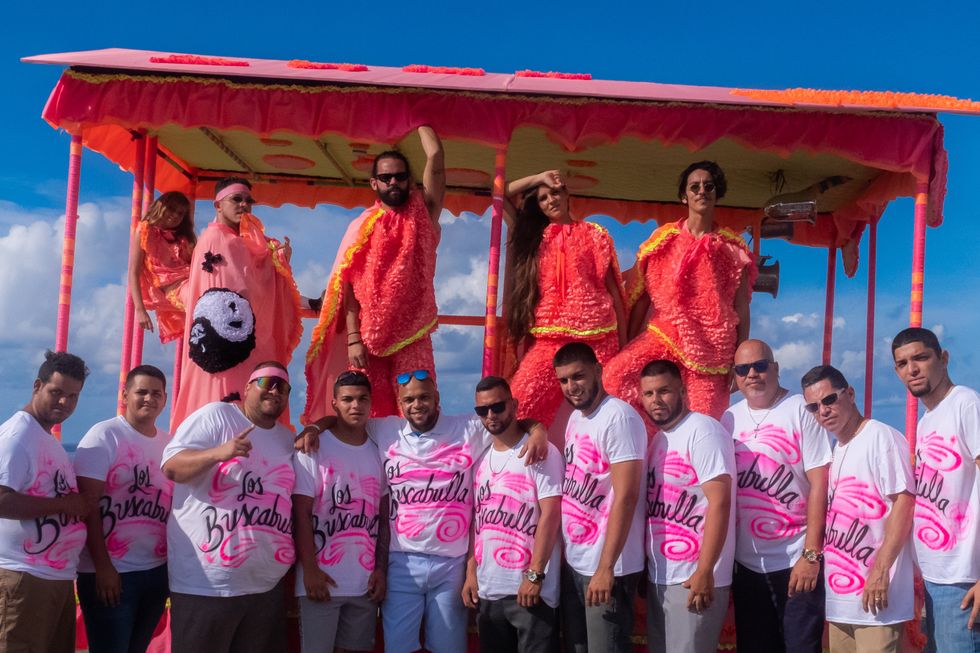
What other meaningful bits are in the video?
Raquel: Definitely the children in the video are symbolic of our daughter, and this new generation. In the middle, like when the other two children are in the video, they're in front of a shut-down school. That school is right in the town of Arecibo, and mind you, Arecibo has had a ton of schools shut down.
These really majestic towns that you can see that had a golden era, and now these city centers in Puerto Rico are kind of abandoned, closed-up things. That was a big deal to us to feature in the video, and maybe shed light on the crisis, and what's going on with schools.

Mass school closures has been a major issue, particularly for rural communities.
Raquel: It's just funny how the first things to go is [schools].
Luis: Like, let's do away with the future of the country.
Raquel: Which is also what's happening with the University of Puerto Rico, where a lot of the money should be going, but it's not where the priorities stand. It all speaks to the same problem, and what we're trying to highlight: A ton of people are leaving and then the austerity measures. I feel like we need enough people to fight, because if we don't watch out for our habichuelas, who really will? You can already see how so many people are taking advantage of the situation. The land-grab situation is crazy.
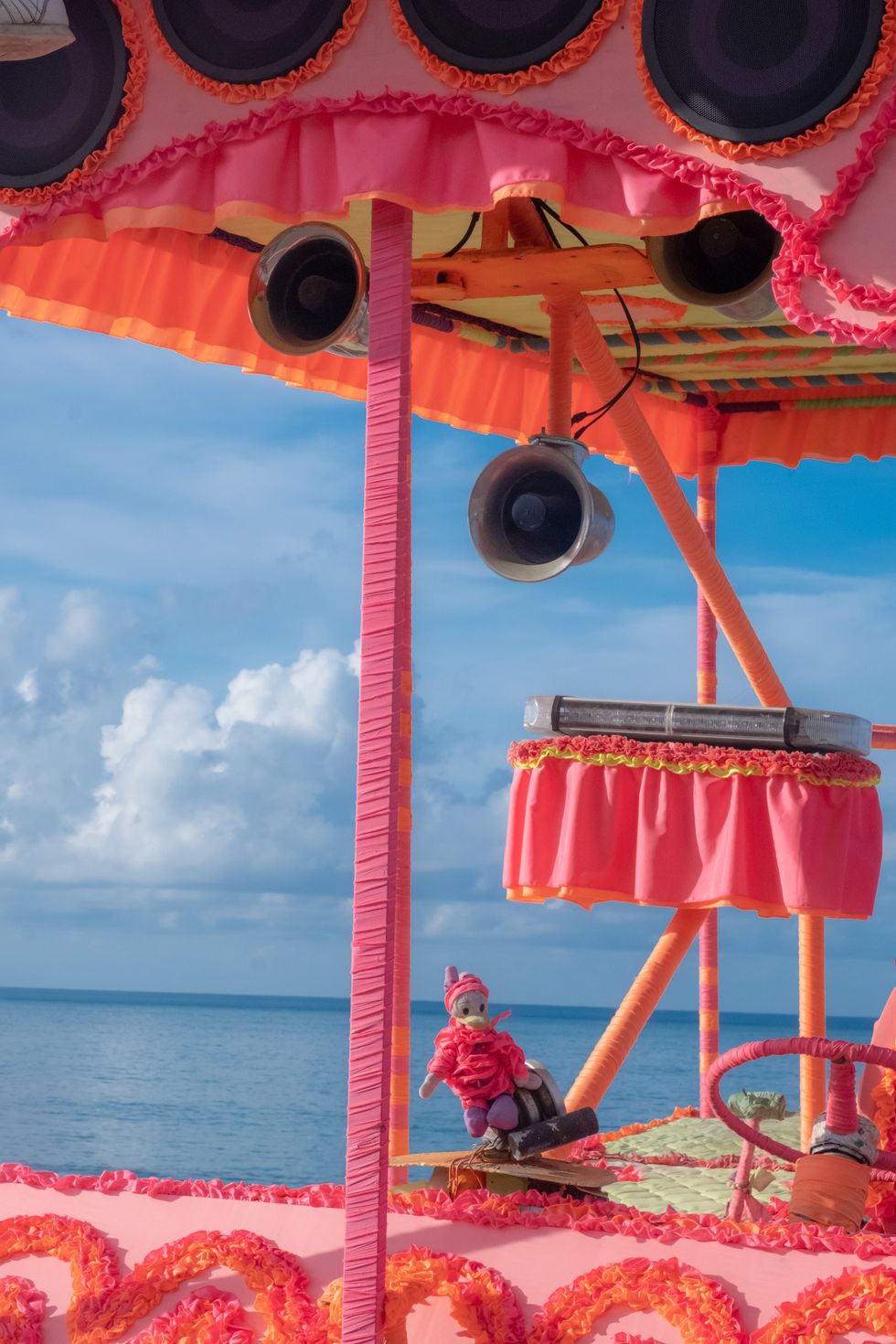
The government's new "opportunity zones" are exacerbating that. There's a lot of pushback from the people.
Raquel: The rezoning, yeah. During the Ricky Renuncia protests, the Junta de Planificación [worked on this] and nobody really knew, and all of the sudden people were surprised by what was happening. It's definitely negligence on the part of the Puerto Rico government, but it's also big interests, really big investors in the island. It's like we're being used —
Luis: A lot of people have mentioned this, but it's clearly going in the direction of the island becoming a resort for the very rich and powerful. And the people who live here and have families here that go back 500 years — those people are their servants.
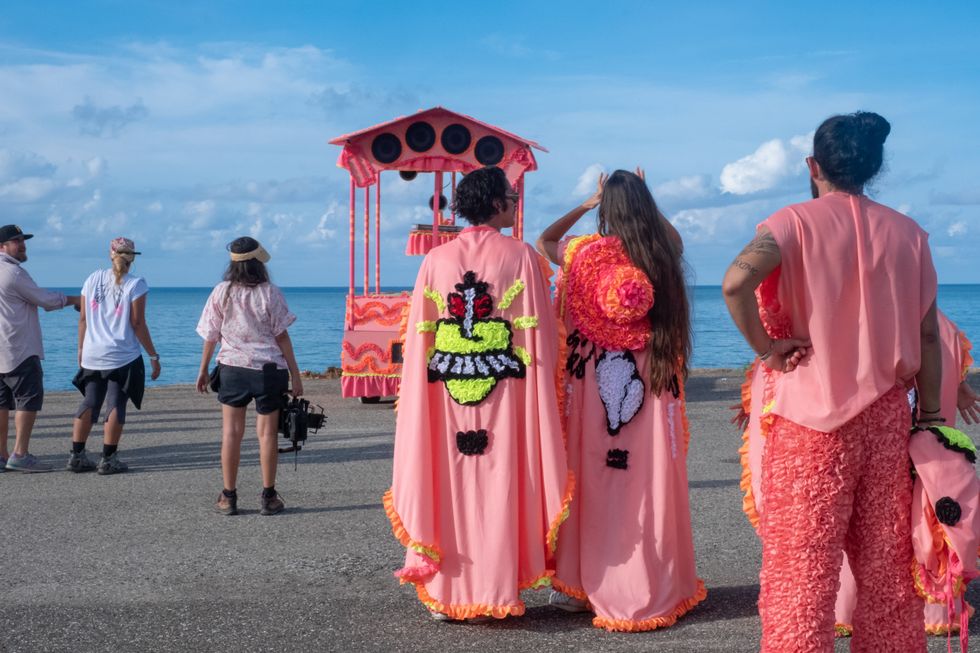
There's ongoing activism work, of course, and community assemblies working to address issues. But if only the huge mobilization during the Ricky Renuncia protests were sustainable...
Raquel: If enough people care about it and we became a bigger movement, I wonder if we could really battle that. At the same time, it's so hard. Even with Airbnb: You see how people themselves are, like, I'm just going to put my house on Airbnb, and fuck it. I'm going to probably fuck up this community, and there will be all of these issues, but it makes money —
Luis: And I need to get by.
Raquel: And who would really blame them? The economy's shit. And everybody wants to stay here — but it's such a fine line. And I think that's our big question now and for the future is: Are we really going to become an island of servitude and all our basic needs and necessities are going to be second and third and fourth priority? It's really the big question to ask. "Vámono" [in Spanish] means "Let's go," but it's also, like —
Luis: "Let's go do something."
Raquel: "Let's go do something," but let's also leave New York and come back. Vámono de aquí, like we need to do something. It's both coming back home, and it's also a call to action to do something about what's going on.
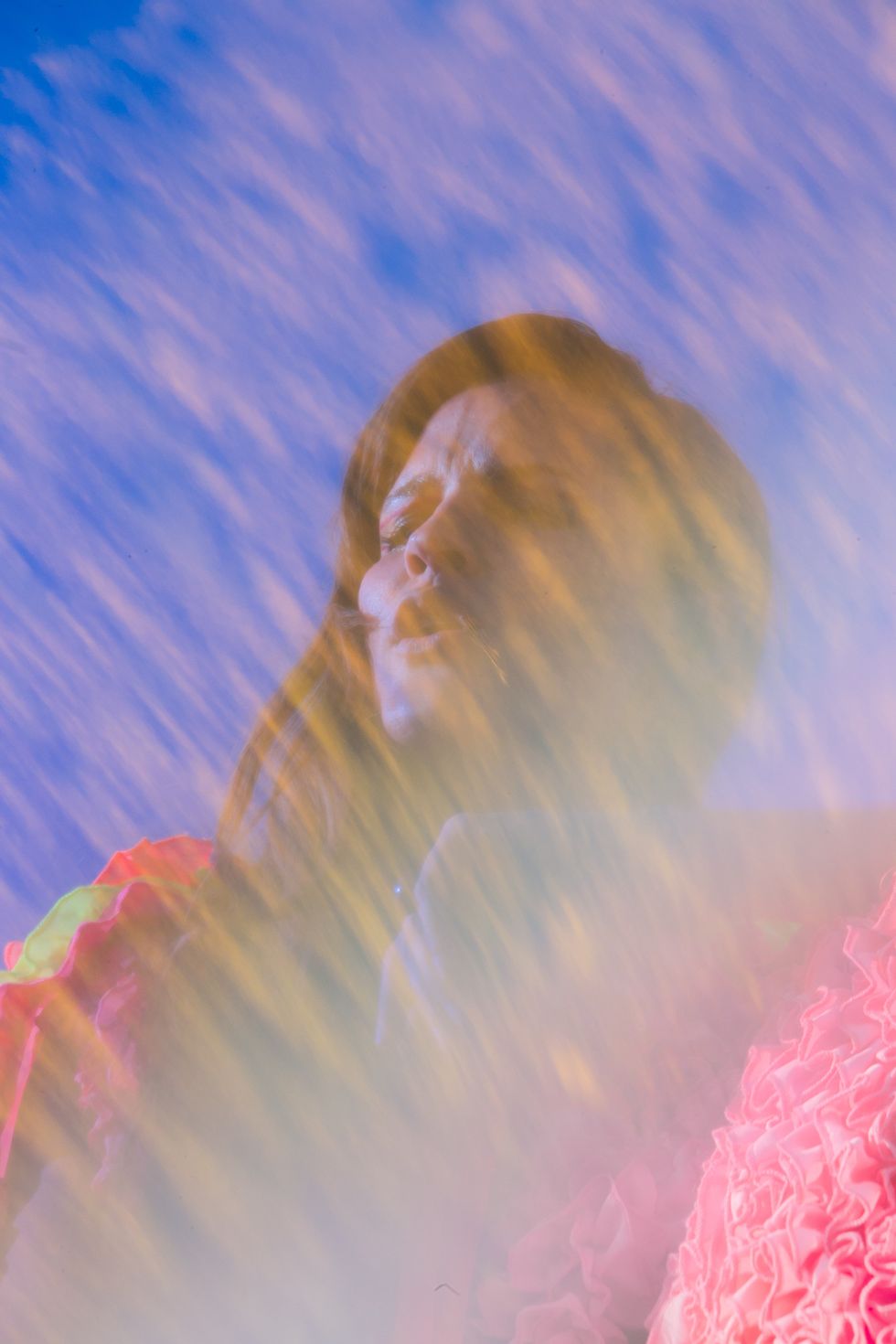
Well, as much as I would like to dismantle capitalism and the system altogether that won't happen right now, so I feel like it's important to get better people in power.
Luis: I think the deepest thing is that it can only be dismantled from within. We are the people that make up this country, that chooses these leaders. The change has to happen — the transformation, deep inside, first.
Raquel: It's a pretty deep thing... and I still think it's a universal thing. It's the same struggles that somebody in America may be fighting for: wanting more community, wanting big, capitalist interests out, and keeping communities and traditions alive. Even though this story is about us coming back home and the issues of Puerto Rico, we really think that there's a universal appeal about it. We hope that even somebody that might not be from here could still understand and relate to it.
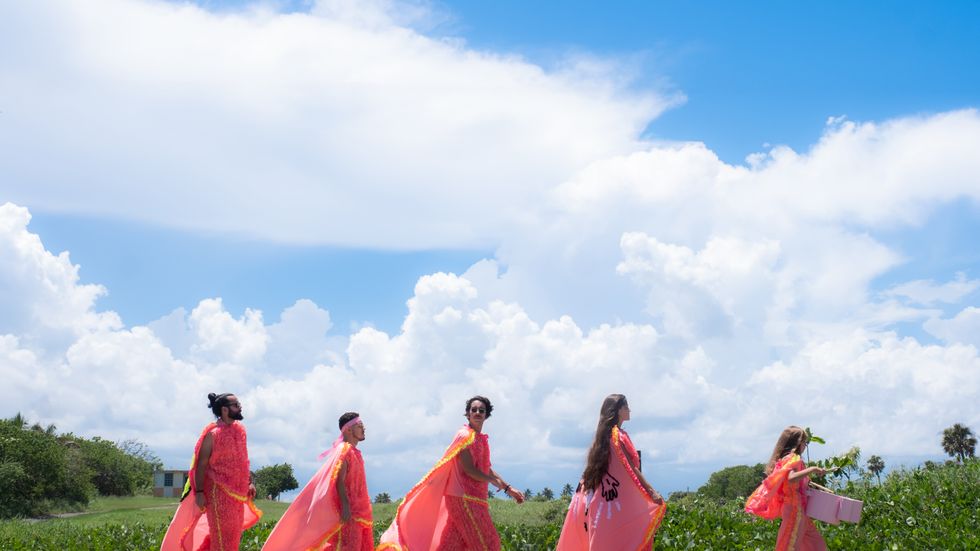
I'm excited to see you two shift in this direction. You are leaders in your own right. You can help fuel change.
Raquel: When we came back, it's all we could really think about when we started making this record. We love making music and it's super fun to play and for people to dance and have fun, but you can maybe make a difference. We won't really know until we put this record out and see what people think about it, but it's an experiment for us to use our medium to see what's up — maybe it can start conversations, or hopefully, with younger people, it can maybe get them a little bit more engaged with the issues.
Photography: Supakid